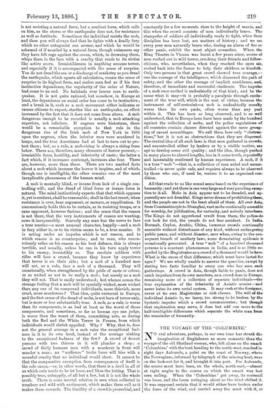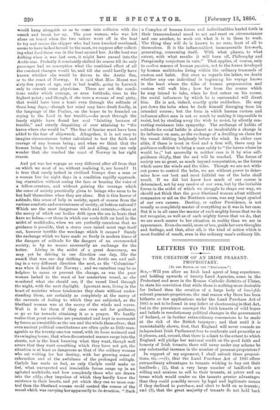THE VOYAGE OF THE COLUMBINE.'
NO real adventure, perhaps, in our own time has streak the imagination of Englishmen as more romantic thanithe voyage of the old Shetland woman, who, left alone on the smack ' Columbine,' with the boat heading to the north-west, reached in eight days Aalsande, a point on the coast of Norway, where the Norwegians, informed by telegraph of the missing boat, were on the look-out for it, and brought it into port. For Aalsuntle, the coarse must have been, on the whole, north-east,—almost at right angles to the course on which the smack was last seen sailing. When the Columbine' got away, its mainsail was loose, and the boom swinging about as the wind shifted it. It was supposed certain that it would either have broken under the force of the wind, and carried away the mast with it, or would hang alongside so as to come into collision with the smack and break her up. The poor woman, who was left
alone on board when the two sailors went off in the boat to try and rescue the skipper who had been knocked overboard, seems to have lashed herself to the mast, we suppose after collect- ing what food there was in the boat around her. As the boat was drifting when it was last seen, it might have passed into the Arctic seas. Probably it constantly shifted its course till its only passenger had no conception what the combined effect of all the constant changes would be, and till she could hardly have known whether she would be driven to the Arctic Sea, or to the coast of Norway. It is said that Miss Monat was sixty-five years of age, and in bad health, going to Lerwick only to consult some physician. These are not the condi- tions under which courage, or even fortitude, rises to the highest point ; and though, if she were a woman of real piety, that would have been a tonic even through the solitude of those long days,—though her mind may have dwelt fondly, in the language of the Psalms, on the hopes to be founded on crying to the Lord in her trouble,—she must through the lonely nights have found her soul "fainting because of trouble," and utterly despairing of ever attaining to "the haven where she would be." The fear of famine must have been added to the fear of shipwreck. Altogether, it is not easy to imagine circumstances better calculated to test the faith and courage of any human being ; and when we think that the human being to be tested was old and ailing, one can only wonder that she reached the coast of Norway in her right reason.
And yet was her voyage so very different after all from that on which we most of ns, without realising it, are bound P It is true that rarely indeed in civilised Europe does a man or a woman live for eight days in a condition rapidly approach- ing starvation without seeing the face or hearing the voice of a fellow-creature, and without gaining the courage which the sense of society practically gives to beings who seem to be but half themselves when they are alone. But is this horror of solitude, this sense of help in society, apart of course from the various comforts and conveniences of society, at bottom rational Which are the most dangerous winds and currents,—those at the mercy of which our bodies drift upon the sea in boats that have no helms,—or those in which our souls drift on land in the midst of multitudes, when we are perfectly conscious that no guidance is possible, that a storm once raised must rage itself out, however terrible the wreckage which it causes P Surely the exchange which we have made so freely in modern times of the dangers of solitude for the dangers of an overcrowded society, is by no means necessarily an exchange for the
better. Living in the midst of a great democracy, we may yet be driving in one direction one day, like the smack that was one day drifting to the Arctic sea and sail- ing in a very different direction the next, as the ' Columbine' was when it headed for Norway ; and we ourselves may be as helpless to cause or prevent the change, as was the poor woman lashed to the mast of her masterless vessel, as she wondered what she should see, if the vessel lived through the night, with the next daylight. Ignorant men, living in the heart of societies whose tendencies they share without under- standing them, are certainly as completely at the mercy of the currents of feeling to which they are subjected, as the Shetland woman was at the mercy of the winds and waves. Well is it for them if they can even ask for guidance, or go so far towards obtaining it as a prayer. We hardly realise that great societies are penetrated and kept in movement by forces as irresistible as the sea and the winds themselves; that even ancient political constitutions are often quite as little man- ageable as the twenty-one-ton vessel, with its loose mainsail and its swinging boom ; that when discontented masses surge into the streets, not in the least knowing what they want, though well aware that they want something which they have not got, the situation is at least as dangerous as that of the solitary woman who sat waiting for her destiny, with her growing sense of exhaustion and of the awfulness of the prolonged solittkde. Carlyle has made us feel, as only Carlyle could make us feel, what unexpected and irresistible forces surge up in an agitated multitude, and how completely those who are drawn into the eddy, obey impulses of which they hardly knew the existence in their hearts, and yet which they can no more con- trol than the Shetland woman could control the course of the vessel which was carrying her apparently to destruction. " Such
a Complex of human forces and individualities hurled forth in their transcendental mood to act and react on circumstances and one another, to work out what it is in them to work. The thing they will do is known to no man, least of all to themselves. It is the inflammablest immeasurable fire-work, generating, consuming itself. With what phases, to what extent, with what results it will burn off, Philosophy and Perspicacity conjecture in vain." That applies, of course, only to molten masses of human passion, not to the forces developed by human multitudes living within the ordinary trammels of custom and habit. But even as regards the latter, we doubt whether any one individual in beginning his voyage knows in the least where the tides of human prepossession and custom will waft him ; how far from the course which he may intend to take, when he first enters on his career, the social influences by which he is surrounded will divert him. He is not, indeed, exactly quite rudderless. He may put down the helm when he finds himself diverging from his intended course ; but the form in which human custom and influence affect men is not so much by making it impossible to resist, but by stealing away the wish to resist, by silently con- verting resistance into sympathy. The exchange of habits of solitude for social habits is almost as incalculable a change in its influence on man, as the exchange of a dwelling on shore for the vessel drifting helplessly before the wind. In either case alike, if there is trust in God and a firm will, there may be guidance sufficient to bring a man safely to "the haven where he would be ;" but assuredly in neither case is it by wise self- guidance chiefly, that the end will be reached. The forces of society are as great, as much beyond computation, as the forces which move the winds and the tides. Though we are not with- out power to control the helm, we are without power to deter- mine how our beat and most faithful use of the helm shall result. If we did but know how much of our course is determined, not by any resolve of our own, but by the invisible forces in the midst of which we struggle to shape our way, we should not think that the poor Shetland woman afloat without companion or aid on the Northern ocean, was any inapt symbol of our own careers. Destiny, or rather Providence, is not usually so completely master of everything as it was in her case. But it is in all cases the master of such mighty forces that we do not recognise, as well as of such mighty forces that we do, that we are much nearer to her situation in reality than we are in appearance. Even she could, more or less, guide her own thoughts and feelings, and that, after all, is the kind of action which is most fruitful of result, even in the ordinary man's ordinary life.



































 Previous page
Previous page